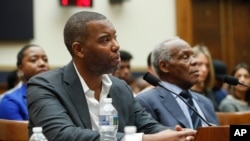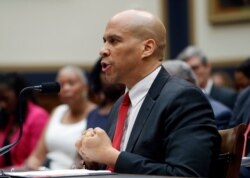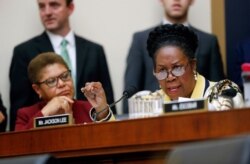An intense debate erupted at the first congressional hearing in 10 years to explore whether the descendants of U.S. slaves should be compensated.
Some said reparations would damage the relationship between white and black Americans, while others said it was key to achieving justice.
Senate Majority Leader Mitch McConnell made it clear that no reparations bill would pass while he controlled the Senate. Asked about the issue Tuesday, McConnell told reporters, “I think we’re always a work in progress in this country, but no one currently alive was responsible for that.”
Rep. Mike Johnson, a Louisiana Republican, was booed as he spoke against “the injustice of monetary reparations from current taxpayers for the sins of a small subset of Americans from many generations ago.”
Several Democratic presidential candidates, including Julian Castro, Beto O’Rourke, and Sens. Elizabeth Warren, Cory Booker and Kamala Harris, support the idea of reparations.
Booker noted that seven black men were shot in his neighborhood Tuesday night, remarking that the response would have been very different in other neighborhoods.
“I look at communities like mine, and you could literally see how communities were designed to be segregated, designed based upon enforcing institutional racism and inequities,” Booker said.
Coates and McConnell
In his testimony to the committee, Ta-Nehisi Coates, author of The Case for Reparations, which was published in The Atlantic magazine in 2014, responded to McConnell.
“For a century after the Civil War, black people were subjected to a relentless campaign of terror, a campaign that extended well into the lifetime of Majority Leader McConnell,” he said.
The House Judiciary subcommittee on the Constitution, civil rights and civil liberties, focused on a bill that would create a commission to study what reparations should be given to the descendants of black people who were enslaved in the United States.
While Democrats support the bill and the idea of reparations in general, 68% of Americans, according to a 2016 Marist Poll, say the United States should not repay the descendants of slaves. This included 81% of white Americans and 35% of black Americans.
Meaning of Juneteenth
The hearing was held on Juneteenth, which commemorates June 19, 1865, when enslaved men and women in Texas learned they were free, 2½ years after President Abraham Lincoln signed the Emancipation Proclamation.
To many, the holiday is as much a celebration of emancipation as it is a day to look back on the nation’s complex racial legacy.
“It helps us to understand and explain why America is the way that it is today," Emory University associate professor of political science Andra Gillespie said in an interview with VOA. "So, while I would rather that America had never been a slave society, the fact of the matter is that it was, and the effects of slavery are still felt in American society today. So, we know from whence we came. And hopefully, we are learning how not to repeat the mistakes of the past.”
“It’s a coming together on this day. And the elders in the family pass on stories to the young. And they pass on our family histories, history of African-Americans, just sort of the legacy of the African-American experience through family stories,” said Floyd Cooper, the illustrator of the children’s book Juneteenth for Mazie.
Conservative faults Democrats
Also testifying in front of the committee were actor Danny Glover and former National Football League player Burgess Owens.
Owens, a conservative author, pointed to the Democratic Party as historically responsible for injustices against black Americans, from slavery to the Ku Klux Klan to the literacy rates for black Americans in Democratic states and cities.
“How about the Democratic Party pay for all the misery brought to my race, and those who, after they learn our history, decide to stay there? And every white American, Republican or Democrat, that feels guilty because of their white skin should need to pony up, also. That way, we can get past this reparation and recognize that this country has given us greatness,” he said.
The debate over reparations has endured since the end of the Civil War. From 1989 until he left Congress in 2017, Rep. John Conyers of Michigan introduced and reintroduced a resolution to study reparations.
This year, the bill was put forward by Rep. Sheila Lee Jackson of Texas.







